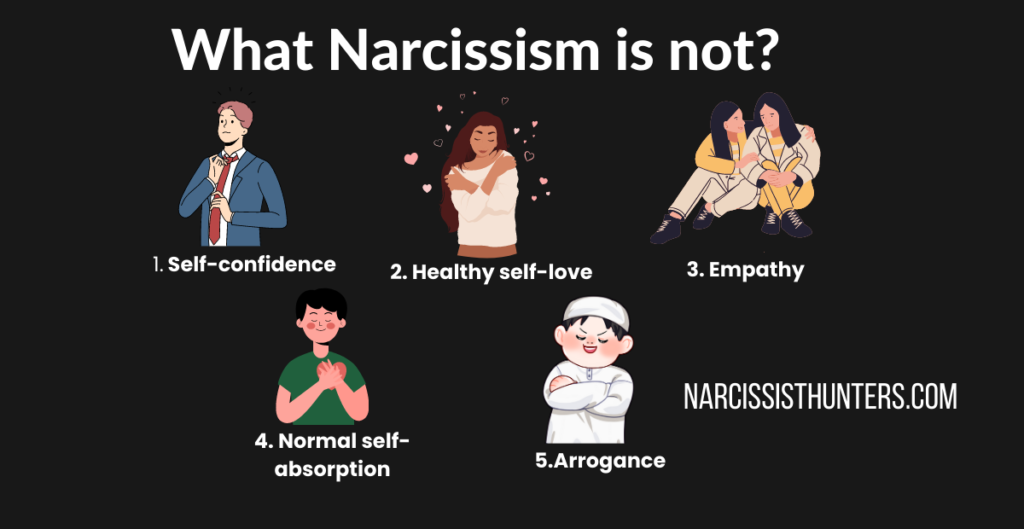Narcissism is a term that is often thrown around in popular culture to describe someone who is vain, self-centered, or overly focused on their appearance. But what does it really mean to be a narcissist? And what causes this personality disorder? In this post, we’ll explore the causes, types, and traits of narcissism so that you can better understand this complex condition and its impact on those who have it.
What is Narcissism?
First, let’s define narcissism. At its core, narcissism is a personality disorder characterized by a grandiose sense of self-importance, a lack of empathy for others, and a need for admiration. People with narcissistic personality disorder (NPD) often have an exaggerated sense of their own abilities and accomplishments, and they may be preoccupied with fantasies of power, success, or attractiveness. They may also be arrogant, demanding, and exploitative of others. I will explain the difference between narcissism and NPd below.
History of Narcissism
The term “narcissism” originated from Greek mythology, where the young man Narcissus became enamored with his own reflection in a pool of water.

In psychology, the concept of narcissism was first introduced by psychologist Havelock Ellis in 1898 and was later developed by Sigmund Freud and other psychoanalytic theorists. The contemporary understanding of narcissism as a personality disorder, characterized by an excessive sense of self-importance, entitlement, and a lack of empathy, was popularized by psychoanalyst Heinz Kohut in the 1970s.
Over the years, various forms of psychotherapy, such as cognitive-behavioral therapy and psychodynamic therapy, have been developed to help individuals with narcissistic personality disorder.
Signs of Narcissism

here are 10 signs of narcissism:
- Inflated sense of self-importance: Narcissists often exaggerate their achievements, abilities, and importance, and they may expect special treatment from others.
- Lack of empathy: Narcissists may have difficulty understanding or caring about other people’s feelings or perspectives, and they may disregard the needs of others in favor of their own.
- Arrogance: Narcissists often display a sense of superiority and entitlement, believing that they are better than others and deserving of special privileges.
- Preoccupation with success and power: Narcissists may be fixated on achieving success, wealth, and power, and they may constantly seek out opportunities to prove their superiority over others.
- Need for admiration: Narcissists crave attention and praise from others, and they may go to great lengths to seek out admiration and adoration.
- Envy: Narcissists may feel jealous or envious of others who they perceive as more successful or accomplished than themselves.
- Exploitative behavior: Narcissists may manipulate and exploit others for their own gain, using charm, flattery, or aggression to get what they want.
- Lack of accountability: Narcissists may be reluctant to take responsibility for their actions or admit when they are wrong, instead blaming others or making excuses.
- Grandiosity: Narcissists may have an exaggerated sense of their own importance and may believe that they are entitled to special treatment or recognition.
- Intolerance of criticism: Narcissists may become defensive or angry when faced with criticism or negative feedback, and may lash out at others who challenge their sense of superiority.
Who Exhibits Narcissism? Understanding Research and Statistic
Research and statistics indicate that narcissistic personality disorder (NPD) affects a relatively small percentage of the general population, with a 2009 study suggesting a prevalence of 6.2%.
Men are more likely to exhibit narcissistic traits, with a prevalence of 7.7%, compared to women with a prevalence of 4.8%. Younger people and those who have never married or are widowed, separated, or divorced are more likely to have NPD. However, as people age, narcissism tends to decrease.
A 2018 study suggests that narcissism is increasing in modern Western societies, indicating a potential “narcissism epidemic.
Examples of Narcissism
- A person who constantly talks about their accomplishments and seeks praise and recognition for everything they do, while disregarding the achievements of others.
- A person who expects special treatment and privileges because they believe they are superior to others in intelligence, beauty, or other qualities.
- A person who manipulates and exploits others for personal gain, without regard for their feelings or well-being.
- A person who constantly seeks attention and admiration from others, using social media and other means to showcase their lifestyle and accomplishments.
- A person who reacts angrily or defensively to any criticism or feedback, refusing to take responsibility for their actions and blaming others for their mistakes.
What Narcissism is not?

Narcissism is often misunderstood and mischaracterized. Here are some things that narcissism is not:
- Self-confidence: While narcissists may appear confident, their confidence often comes from a place of insecurity and the need for validation rather than a genuine sense of self-worth.
- Healthy self-love: Narcissism is characterized by an excessive and distorted view of oneself, while healthy self-love involves a balanced and realistic view of oneself.
- Empathy: Narcissists lack empathy and are often incapable of understanding or caring about the feelings of others.
- Normal self-absorption: It’s normal to think about oneself and one’s needs, but narcissism goes beyond this to a pathological self-obsession.
- Arrogance: While narcissists may come across as arrogant, true arrogance often stems from a place of entitlement and a belief in one’s superiority, rather than insecurity and the need for validation.
Understanding what narcissism is not can help to dispel common misconceptions and promote a more accurate understanding of this complex personality trait.
Difference between Narcissism and Narcissistic personality disorder
Narcissism is a personality trait that can range from healthy self-confidence to an unhealthy preoccupation with oneself. Narcissistic Personality Disorder (NPD) is a more severe form of narcissism that is characterized by an inflated sense of self-importance, a need for admiration and attention, and a lack of empathy for others. NPD is a recognized mental health disorder that can cause significant difficulties in personal and professional relationships.
The key difference between narcissism and NPD is that NPD is a diagnosable mental health condition that meets specific criteria outlined in the Diagnostic and Statistical Manual of Mental Disorders (DSM-5).
In order to be diagnosed with NPD, an individual must exhibit a persistent pattern of grandiosity, a need for admiration, and a lack of empathy for others, which must cause significant distress or impairment in their daily functioning.
While most people may exhibit some narcissistic traits at times, it is only when these traits become pervasive and cause significant problems in an individual’s life that they may meet the criteria for NPD.
A mental health professional is best equipped to diagnose NPD, as it requires a thorough evaluation of an individual’s thoughts, feelings, and behavior patterns.
Types of Narcissism
There are several types of narcissism, including:
- Grandiose narcissism: This type of narcissism is characterized by an inflated sense of self-importance, a need for admiration, and a lack of empathy towards others.
- Vulnerable narcissism: Individuals with this type of narcissism may appear shy or introverted, but they are still preoccupied with themselves and their own needs. They may also be prone to feelings of insecurity and may react negatively to criticism or rejection.
- Malignant narcissism: This is a more extreme form of narcissism that involves a combination of grandiosity, aggression, and a lack of empathy. People with this type of narcissism may be prone to violence or other harmful behaviors.
- Communal narcissism: This type of narcissism involves a focus on the individual’s role in the community or group rather than on the individual themselves. People with communal narcissism may still have an inflated sense of self-importance, but they may also be focused on helping others or contributing to the group.
- Covert narcissism: Individuals with covert narcissism may appear modest or self-effacing, but they are still preoccupied with their own needs and desires. They may also be prone to feelings of envy or resentment towards others.
Root causes of Narcissism
The root causes of narcissism are not completely understood and are likely to be the result of a complex interplay of genetic, environmental, and psychological factors. Some of the contributing factors to the development of narcissistic traits include:
- Childhood experiences: Childhood experiences, such as being overly praised or criticized, neglect, abuse, or having a parent with narcissistic traits, can contribute to the development of narcissistic tendencies.
- Genetics: Research suggests that there may be a genetic component to narcissistic personality traits, and that these traits may be partially inherited.
- Brain function: Some research has suggested that differences in brain function, such as differences in the regulation of certain neurotransmitters, may contribute to the development of narcissistic traits.
- Attachment style: People with an insecure attachment style, who have difficulty forming close and trusting relationships, may be more likely to develop narcissistic tendencies as a way of coping with their insecurities.
- Society and culture: Cultural and societal factors, such as a focus on individual achievement and success, can also contribute to the development of narcissistic traits.
It is important to note that not everyone who experiences these factors will develop narcissistic traits, and that these factors likely interact in complex ways to contribute to the development of narcissism. Additionally, not all individuals with narcissistic traits have a diagnosable mental health condition.
The Impact of Narcissism on Narcissist’s life
Narcissism can have a significant impact on a person’s life, both for themselves and those around them. Here are some ways in which narcissism can affect a person’s life:
- Difficulty forming and maintaining relationships: Narcissists often have trouble forming genuine connections with others due to their self-absorption and lack of empathy. This can lead to a cycle of shallow relationships that ultimately leave them feeling unfulfilled and alone.
- Poor self-esteem: Despite their grandiose exterior, narcissists often struggle with low self-esteem and a need for constant validation. They may be quick to anger or react defensively when they feel their ego has been threatened.
- Lack of personal growth: Narcissists often have difficulty admitting fault or taking responsibility for their actions, which can hinder their personal growth and development. They may be resistant to constructive feedback or criticism, as they see it as a threat to their self-image.
- Job-related issues: Narcissistic individuals may have difficulty working in team settings or following direction from others. They may also struggle with feedback or constructive criticism, leading to job-related issues.
- Legal issues: In extreme cases, narcissistic individuals may engage in illegal or unethical behavior to maintain their sense of power and control. This can lead to legal issues and a damaged reputation.
Overall, narcissism can have a negative impact on a person’s relationships, self-esteem, personal growth, and even their legal standing. It’s important for individuals struggling with narcissism to seek professional help in order to address these issues and work towards a healthier sense of self.
How Is Narcissism Diagnosed?
Narcissism is typically diagnosed by a mental health professional, such as a psychologist or psychiatrist, through a comprehensive assessment process. Here are some of the steps involved in diagnosing narcissism:
- Initial evaluation: The first step is for the mental health professional to conduct an initial evaluation to gather information about the individual’s symptoms, medical history, and family history.
- Diagnostic criteria: The mental health professional will then refer to the diagnostic criteria in the Diagnostic and Statistical Manual of Mental Disorders (DSM-5) to determine whether the individual meets the criteria for narcissistic personality disorder (NPD).
- Psychological testing: The mental health professional may use psychological tests to gather more information about the individual’s personality traits, cognitive functioning, and emotional state.
- Interviewing family members or loved ones: The mental health professional may also interview family members or loved ones to gather additional information about the individual’s behavior and symptoms.
- Differential diagnosis: The mental health professional will also consider other conditions that may present with similar symptoms, such as borderline personality disorder or bipolar disorder.
It’s important to note that the diagnosis of narcissism is not based solely on the presence of certain behaviors or personality traits, but on the extent to which these behaviors or traits interfere with the individual’s ability to function in their daily life. A diagnosis of narcissism should only be made by a qualified mental health professional.
Can Narcissism be Cured?
While there is no cure for narcissistic personality disorder, there are therapies available that can help those affected manage their symptoms and lead happier and more fulfilling lives.
Psychotherapy is the primary form of treatment for narcissism. This type of therapy focuses on helping the person understand how their behavior affects others and how to change it in order to create healthier relationships with others. Cognitive Behavioral Therapy (CBT) is often used as part of this treatment, as it helps individuals identify patterns in their behavior that may be contributing to their narcissism and learn new ways to cope with difficult situations.
In addition to psychotherapy, medication may also be prescribed if necessary. Medication can help reduce symptoms such as anxiety or depression that may be associated with narcissism.
It is also important for those affected by narcissism to recognize the importance of self-care and support from family and friends in managing their condition. Self-care activities such as exercise, relaxation techniques, journaling, or spending time outdoors can help reduce stress levels and provide an outlet for emotions that may otherwise become overwhelming. Additionally, having a strong network of supportive people who understand the challenges associated with narcissism can provide comfort during difficult times.
Although there is no cure for narcissistic personality disorder, therapy options are available that can help those affected manage their symptoms and lead more fulfilling lives. With the right combination of psychotherapy, medication, self-care activities, and support from family and friends, those living with narcissism can find hope in knowing they are not alone in this journey.
Coping with and managing symptoms of narcissistic traits in daily life.
Here are 10 practical tips for coping with and managing symptoms of narcissistic traits in daily life:
- Acknowledge your behaviors: Recognize the impact your behavior may be having on those around you and take responsibility for it.
- Seek therapy: A qualified therapist can help you gain insight into your narcissistic traits and develop healthier coping mechanisms.
- Practice empathy: Work on developing your ability to see things from others’ perspectives and validate their feelings.
- Set healthy boundaries: Learn to set clear boundaries in relationships and respect the boundaries of others.
- Practice gratitude: Focus on what you have and be thankful for the good things in your life.
- Be open to feedback: Learn to accept constructive criticism and use it as an opportunity for growth.
- Develop self-awareness: Practice self-reflection and learn to recognize when your narcissistic tendencies are coming into play.
- Cultivate self-compassion: Learn to be kind and understanding towards yourself, just as you would towards others.
- Focus on personal growth: Invest time and effort into developing new skills and pursuing personal interests.
- Practice self-care: Take care of your physical, emotional, and mental well-being by engaging in activities that bring you joy and reduce stress levels.
Frequently Asked Questions About Narcissism
What is Narcissism?
Narcissism is a personality disorder that affects a person’s ability to empathize with others and their need for admiration.
What are the key symptoms of Narcissism?
The key symptoms of Narcissism include grandiosity, a constant need for admiration, lack of empathy, and an exaggerated sense of self-importance.
What are the potential causes of Narcissism?
Here are several potential causes of Narcissism, including Genetics,childhood trauma, overindulgence attachment style,society and culture and a lack of positive reinforcement for prosocial behaviors.
Is Narcissism a treatable condition?
There is not no treat, but symptoms can get better with psychotherapy, medication, and mindfulness practices.
What is the difference between self-love and Narcissism?
Self-love is a healthy level of self-esteem and self-confidence, while Narcissism is an excessive and distorted sense of self-importance.
Who is most likely to develop Narcissism?
Narcissism can affect anyone, but certain factors can increase a person’s risk of developing the condition, such as being raised by a Narcissist, experiencing a traumatic upbringing, and growing up in a culture that promotes and rewards self-promotion.
How can Narcissistic tendencies affect one’s life?
Narcissistic tendencies can lead to strained relationships, social isolation, and an inability to empathize with others.
Are there any tests or evaluations that can diagnose Narcissism?
Yes, there are several tests and evaluations that can diagnose Narcissism, including the Narcissistic Personality Inventory (NPI) and the Minnesota Multiphasic Personality Inventory (MMPI).
Can medication treat Narcissism?
Medication alone cannot treat Narcissism, but it can help manage symptoms that are often associated with the disorder, such as depression and anxiety.
How long does treatment for Narcissism typically last?
The duration of treatment for Narcissism can vary depending on the individual’s needs and the severity of their condition. Treatment typically lasts for several months to several years.
Can therapy help a person with Narcissism develop empathy?
Yes, therapy can help a person with Narcissism develop empathy by teaching them how to recognize and regulate their emotions and how to view situations from another person’s perspective.
Are there any support groups available for individuals with Narcissism?
Yes, support groups such as Narcotics Anonymous and Co-Dependents Anonymous are available for individuals with Narcissism.
How can someone support a loved one with Narcissism?
Supporting a loved one with Narcissism involves setting boundaries, maintaining open and honest communication, and seeking support from professionals or support groups.
Last words
Contrary to popular belief, narcissism isn’t just about self-love and admiration. In fact, there are different types of narcissism, each with their own set of symptoms. And while there is no “cure” for Narcissistic Personality Disorder, treatment options are available that can help manage the symptoms. If you think you or someone you know might be suffering from Narcissism , it’s important to seek professional help.

Great article. You wrote a well briefed article on Narcissism
Pretty! This has been a really wonderful post. Many thanks for providing these details.